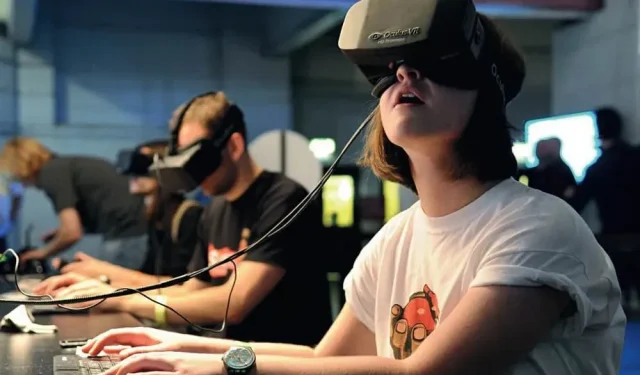Is playing in virtual reality harmful to health?

Video games in virtual reality are becoming more and more popular, but this is not a safe practice. Here’s what we know.
VR video games are on the rise and skyrocketing in popularity, but some experts and industry observers are concerned about the health risks (eye strain, migraines, falls, etc.) of using the technology too often (too often). Here’s what we know today about virtual reality and its potential health impacts, both negative and positive.
Is virtual reality harmful to your eyes?
Some health risks in virtual reality are obvious. When you wear a helmet, audio and video partially block out your immediate surroundings, greatly increasing your risk of falling. However, other health problems may appear over time. Some ophthalmologists, for example, worry about possible eye fatigue and long-term consequences for the connections between the eye and the brain.
Excessive screen time can lead to computer/machine vision syndrome. However, this does not only apply to VR headset screens. Regular screen breaks help prevent this condition, as does wearing eyeglasses.
That being said, VR screens are in some respects very different from traditional LCD screens. Indeed, for each eye there is a screen, each of which is located at a distance of several centimeters. This dual-screen configuration may contribute to what scientists call the conflict between vergence and accommodation. It makes you believe that something very close ends up being very far away. This conflict is known to cause fatigue and visual discomfort. For some users, it can even lead to persistent headaches and nausea. This conflict can even cause long-term vision problems.
The eyes most at risk for these eye problems are those in which the eyes and the connections between the eyes and the brain are not fully developed. UCLA optometry professor Martin Banks told CNN that too much time spent in virtual reality puts children at risk of developing myopia.
Negative effects of video games in virtual reality when a person is sick or injured
Depending on your general health – such as illness, injury, or a tendency to motion sickness – playing in VR can be risky and/or unpleasant.
Mashable’s Tina Amini spoke about her experience after days at GDC showing off video games while recovering from a concussion – an injury that can cause a range of symptoms: balance problems, abnormal eye movements, loss of coordination, etc. -. Tina Amini’s conclusion is that playing in virtual reality can aggravate already existing symptoms, such as motion sickness. These are only testimonials from personal experience, but there are a lot of them, and they are backed up by research and medical publications.
According to CNN, most VR devices advise you to consult a doctor before using them if you are “pregnant, elderly, or have an existing medical condition that could affect your VR experience, such as vision problems, psychiatric, cardiac, or other serious medical problems.”Some warnings refer to epileptic seizures or loss of consciousness. Such incidents can occur even without any known medical problems.
The study found that virtual reality can elicit a strong emotional response—compared to something similar displayed on a traditional screen—which some people may find difficult to handle. There are also concerns that the use of virtual reality could slow down or even jeopardize the recovery of users suffering from sinus infections, headaches, vision problems, stomach pains or even a cold. Such anxiety requires the complete disappearance of physical balance, which can be disturbed by virtual reality.
In other words, if VR video games don’t actually cause long-term damage to people’s health, they could make it harder to recover from illness or injury.
Can virtual reality improve health?
Jeremy Bailenson, director and founder of the Virtual Human Interaction Lab at Stanford University, is more optimistic about the effects of virtual reality. In particular, he said on an MIT Press podcast that he is convinced that virtual reality may even have the potential to improve our health by blurring the lines between the virtual world and the real world. With virtual reality, it becomes possible to experience virtual scenarios that look very real – for example, interacting with virtual food can help people eat less and feel more energized.
There are also a number of studies on medical applications for virtual reality. Scientists have used video games and virtual reality simulators for a variety of purposes, such as improving balance or mental health.
So, is virtual reality safe? Research suggests that there may indeed be minor risks when it comes to VR gaming, but no major side effects have been reported to date. At the moment, it is very difficult to understand what long-term health consequences – positive or negative – virtual reality can have. Headset wearers should take VR responsibly and take regular breaks.
Leave a Reply